by Derek Davison
Russia moved to annex Crimea this week, as Ukraine evacuated most of its soldiers from the peninsula. Tensions in eastern Ukraine seem to have reached a tense equilibrium, even as reports of a Russian military build-up along its Ukrainian border raised the possibility of another incursion.
Recent events
Moving quickly on the heels of last week’s referendum on Crimean independence, in which Crimean voters nearly unanimously voted to secede from Ukraine and become part of Russia, Russian President Vladimir Putin on Friday signed into law a bill to formally annex the peninsula. On Thursday, one day before a temporary truce between Ukrainian and Russian forces in Crimea was set to expire, the Ukrainian defense ministry announced that plans were “well underway” to evacuate and resettle the roughly 25,000 Ukrainian soldiers currently stationed in Crimea to other parts of Ukraine. Pro-Russian forces stormed the Belbek airbase near Sevastopol, wounding one Ukrainian soldier and taking the base commander prisoner. The interim Crimean government issued an order for Crimea’s Tatar population to vacate part of the land on which it is currently settled, but insisted that it will allocate other land for Tatar settlement and that Tatars will be “well represented” in the Crimean government moving forward.
The New York Times characterized the situation in the eastern part of mainland Ukraine as “an uneasy calm” between “entrenched pro-Russian and pro-Western camps that scarcely existed before [the uprisings in Kiev].” Pro-secession fervor there is at a high level, particularly in large cities that tend to have higher proportions of Russians and Russian-speakers than the surrounding countryside. Friday’s announcement that the Ukrainian government had signed an association agreement with the European Union, a deal that will bring the two parties into “closer economic and political cooperation,” raised fears that tensions in the more pro-Russian east could rise still higher.
The Organization for Security and Cooperation in Europe announced that it would deploy civilian observers to Ukraine (not including Crimea), after Russia dropped its objections to such a move. However, NATO officials continued to express concern over an alleged Russian troop buildup along its Ukrainian border, suggesting that the units could be used either to invade mainland Ukraine or to cross Ukraine and seize control of the breakaway Moldovan region of Transnistria, whose leaders requested that Russia annex it earlier this week. The Russian government claimed that any troop movements were part of routine military exercises and that there were no plans to cross the border into Ukraine. Ukraine’s acting foreign minister, Andrii Deshchytsia, told American media that the chance of a Russian-Ukrainian war was “becoming higher.”
The United States and the EU levied further sanctions against top Russian officials and allies of President Putin on Friday. The new list of American targets includes Putin’s chief of staff as well as key figures in Russia’s energy and banking sectors. The EU list includes several figures who had been named in the initial round of US sanctions on Monday. A Kremlin spokesman said that the Russian government was “bewildered” by the new sanctions and promised that it would retaliate, which it then did by placing travel bans on several American political figures, including Senators Harry Reid and John McCain and Speaker of the House John Boehner.
There are two disputed narratives that are fueling the ongoing conflict:
Was the Crimean referendum legitimate?
Although the Ukrainian government appears to have no intention of contesting Russia’s annexation of Crimea on the ground, it, along with the US and EU, has insisted that last week’s referendum is illegal under both international and Ukrainian law. Russia has argued that the referendum was consistent with international law, specifically Article 1 of the UN Charter (which mentions “respect for the principle of equal rights and self-determination of peoples” as one of the UN’s guiding principles), and Putin has specifically cited Kosovo’s secession from Serbia (which Russia opposed) as having set the precedent for this similar act by Crimea.
International law does not take a firm position on the question of self-determination versus national sovereignty. Without a clear declaration by a body like the UN Security Council there is no “law” that deals conclusively with Crimea’s decision to leave Ukraine and join Russia. Kosovo is a problematic case to use as precedent, given that its secession was the product of a war in which Serbians committed war crimes against Kosovar Albanians (though in fairness the Albanian rebels committed war crimes of their own). There is evidence of some mistreatment of Ukraine’s Russians, but a UN report (which Russia rejects) found no systematic abuses. However, the fact that the first act of the interim Ukrainian government was an aborted attempt to repeal the country’s law governing the use of official minority languages was cause for alarm among Ukrainian Russian-speakers.
Under Ukrainian law there is no question that the referendum is illegal, since Article 73 of the Ukrainian constitution requires that any changes to Ukraine’s territory be approved in an “All-Ukrainian referendum.” Last week’s Crimean vote was regional, and therefore does not meet this requirement. However, given that the Crimean and Russian governments do not recognize the authority of the interim Ukrainian government, they presumably reject its invocation of the constitution as well.
Is the Ukrainian government legitimate?
The Ukrainian government obviously thinks so, and so do the US and EU. But there is no disputing the fact that Viktor Yanukovych was the legally elected president of Ukraine before his ouster, and Russia’s official position has been that it still recognizes him as Ukraine’s rightful president, though it has not pushed for his restoration. Russia has characterized the Euromaidan protest movement that removed Yanukovych from office as an “armed fascist coup,” engineered with considerable American support. Far-right Ukrainian parties did play a large part in the protest movement, as evidenced by the sizable role that they have been given in the interim Ukrainian government. Moreover, a recording of a January phone call between Assistant US Secretary of State Victoria Nuland and US Ambassador to Ukraine Geoffrey Pyatt shows that American officials were at least discussing ways to assist the protest movement and what a post-Yanukovych government might look like. Russia also accuses the EU of having spurred the protests by forcing the Ukrainian government to choose between Russia and the EU rather than allowing it to have strong ties with both, an accusation that EU officials have denied.
On the other hand, the US supported a February 21st agreement that would have kept Yanukovych in office but restored Ukraine’s 2004 constitution (which reduced the power of the presidency relative to parliament). That deal collapsed when protesters (including the far-right elements of the movement) rejected it, despite the fact that several protest leaders had already signed off on it. Further, while the Nuland phone call is evidence that the US government supported the protesters, it is not in itself evidence of the level of that support, let alone of the idea that the US was actually behind the movement. The Obama administration contends that Yanukovych forfeited his authority when he fled the country after the February 21 agreement collapsed. Yanukovych, who also recorded a statement resigning his office, which he later retracted, was impeached and removed from office by the Ukrainian parliament. Nevertheless, there are serious questions as to the constitutionality of that impeachment vote and the manner in which Yanukovych’s successor was determined.
Photo: Crowds waving Crimean and Russian flags in Simferopol in Crimea after the referendum. Credit: Alexey Yakushechkin/IPS

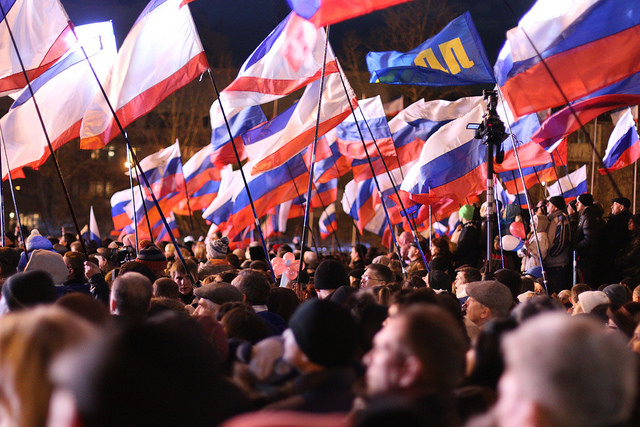
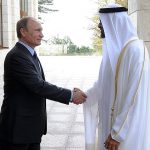
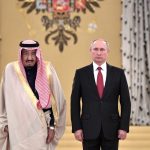
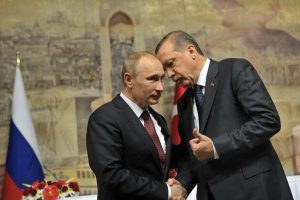
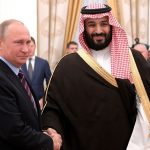
Nice to see this post, keeping us up to speed on the subject. Of course, it really doesn’t answer the question of just who’s on top, the People, the Nazis, the Western Bankers, or why the E.U. would partner with NATO on Russia’s door step. Overconfidence by the U.S./NATO/E.U., with the I.M.F./Western Bankers, without a doubt, leaves the Ukrainian population in the dark, if not a hole. The Neocon gamble of a possible confrontation leading to WW3, is dangerous, just like Netanyahoo’s threats of going it alone in bombing Iran’s Nuclear facilities in 2014. All these players better take a break and ponder their choices, before they find out that they have bit off more then they bargained for. Russia still has a formidable Nuclear strike capability, and once again, the E.U. is right in the middle. Once the shooting starts, there’s no going back.